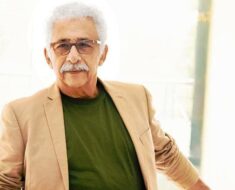Mohammed Zahur “Khayyam” Hashmi, a legendary Indian music composer, left an indelible mark on the nation’s cinematic soundscape. His contributions to Hindi film music are celebrated even today.
Wiki/Biography
Saadat Hussain, known to the world as “Khayyam,” was born on Friday, 18 February 1927, in Rahon, Nawanshahr District, Punjab, British India. His zodiac sign was Aquarius. He showed an early passion for music, leaving home in his teens to pursue his studies, although he later returned to complete his formal education. Fate led him to his uncle’s home in Delhi, where his uncle, recognizing his talent and inclination towards films, supported his musical pursuits. He received training under the guidance of Pandit Amar Nath. Khayyam’s journey continued to Lahore, where he met and learned from the renowned Punjabi music composer, Baba Chishti.
Physical Appearance
- Height (approx.): 5′ 4″
- Eye Colour: Dark Brown
- Hair Colour: Grey (semi-bald)
Family, Caste & Wife
Khayyam hailed from a highly educated Muslim family. His siblings resided in Pakistan. He married Jagjit Kaur (a singer) in 1954. Their son, Pradeep Khayyam, sadly passed away from a heart attack on 25 March 2012.
Career
At 17, Khayyam began his career in Lahore as an assistant to Baba Chishti, where his duties involved rehearsing singers and musicians. After six months, he returned to Ludhiana in 1943. A brief period in the army during World War II preceded his move to Bombay (now Mumbai) to pursue a career in films. He debuted as part of the Sharmaji-Varmaji composer duo with the film “Heer Ranjha” in 1948. Early success came with “Akele Mein Wo Ghabrate to Honge” from “Biwi (1950),” sung by Mohammed Rafi. He adopted the name “Khayyam” for the film “Foot Path (1953).” His reputation solidified with films like “Phir Subha Hogi (1958),” featuring songs by Sahir Ludhianvi and sung by Mukesh and Asha Bhosle. His career truly blossomed after “Shola Aur Shabnam (1961).” His most acclaimed works include “Shagoon (1964),” “Kabhi Kabhie (1976),” “Trishul (1978),” “Dard (1981),” “Dil-E-Nadan (1982),” and “Umrao Jaan (1981).”
Other Works
Beyond composing, Khayyam also showcased his singing talent, debuting with “Dono Jaha Teri Mohabbat Me Haar Ke” in “Romeo & Juliet (1947).” He also sang “Kab Yaad Mein Tera Saath Nahin” in “Anjuman (1986)” and acted in the 1948 film “Yeh Hai Zindagi.”
Famous Tune(s)
Khayyam’s legacy includes unforgettable melodies:
- “Kabhi Kabhie Mere Dil Mein” from “Kabhi Kabhie (1976)”
- “Main Pal Do Pal Ka Shayar Hoon” from “Kabhi Kabhie (1976)”
- “In Ankhon Ki Masti Ke” from “Umrao Jaan (1981)”
- “Dil Cheez Kya Hai” from “Umrao Jaan (1981)”
- “Aaja Re O Mere Dilbar” from “Noorie (1979)”
Awards & Honours
Khayyam’s contributions were widely recognized:
| Award | Year |
|---|---|
| Hridaynath Mangeshkar Award | 2018 |
| Padma Bhushan | 2011 |
| Sangeet Natak Akademi Award: Creative Music | 2007 |
| National Film Award for Best Music Direction (“Umrao Jaan”) | 1982 |
| Filmfare Award for Best Music Director (“Kabhi Kabhie”) | 1977 |
| Filmfare Award for Best Music Director (“Umrao Jaan”) | 1982 |
| Filmfare Lifetime Achievement Award | 2010 |
He received numerous other accolades throughout his career.
Address
7th Floor, Dakshin Apartments, Juhu, Mumbai
Favourite Things
- Dessert: Laddoo
- Food: Gujarati Cuisines
- Restaurant(s): Sarvi in Nagpada, Mumbai; Kareem’s at Mohammad Ali Road, Mumbai
- Singer(s): Mohammed Rafi, Asha Bhosle, Lata Mangeshkar, Talat Mahmood, K. L. Saigal, Kishore Kumar
- Actor: Rajesh Khanna
- Actress(es): Meena Kumari, Rekha
- Music Director(s): S. D. Burman, R. D. Burman, Laxmikant-Pyarelal, Shankar Jaikishan, Naushad
- Poet(s): Sahir Ludhianvi, Kaifi Azmi
Net Worth
Khayyam’s net worth was estimated to be around Rs. 10 crores (in 2016).
Death
Following a lung infection, Khayyam was admitted to Sujay Hospital in Juhu, Mumbai on July 28, 2019. He passed away on August 19, 2019, at 9:30 PM (IST) due to cardiac arrest.
Facts
Khayyam enjoyed watching films and listening to music. His father shared his passion for music, literature, and poetry, often taking his family to the movies. At the height of his career, Khayyam was considered the “Naushad” of his time. His marriage to Jagjit Kaur, from an aristocratic Punjabi family, was a notable inter-communal union, despite initial disapproval from her father. He collaborated with poets known for their strong poetic backgrounds, infusing his music with the essence of ghazals and poems. His work with Asha Bhosle on “Umrao Jaan (1981)” is considered among her best. He also worked with Lata Mangeshkar, starting with “Pyaar Ki Baatein (1951).” Jagjit Kaur was a college classmate of former Prime Minister Manmohan Singh, who visited the couple in 2006. At 90, Khayyam established the “Khayyam Jagjeet Kaur KPG Charitable Trust” to support aspiring artists and technicians in the film industry. Throughout his career, he intentionally limited his projects to maintain quality, composing for only 57 films.







